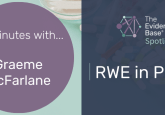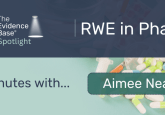Report into state of NHS England reveals untapped opportunities to leverage real-world data to transform patient care

The highly anticipated Darzi report highlights the need for ‘major tilt towards technology’ to fully capture the richness of health data found within the NHS.
A new report, commissioned by the newly formed Labour government, has provided a critical review of the National Health Service (NHS) in England, highlighting a number of crucial issues that need to be urgently addressed. The report, titled ‘Independent Investigation of the National Health Service in England’ and prepared by Professor Lord Darzi of Denham, describes the NHS as being in a ‘critical condition’ due to chronic underfunding, workforce shortages, and inefficiencies in management and data systems. The report outlines key recommendations to ensure the NHS can better meet the needs of the public, including shifting towards better health equity, preventative care, improving digital infrastructure, and fostering research and innovation.
“The extraordinary richness of NHS datasets is largely untapped either in clinical care, service planning, or research.”
As a single healthcare system, NHS England provides a unique ‘cradle to grave’ research opportunity to capture real-world data (RWD) from the entire population of the country. The report highlights successful examples like the Whole Systems Integrated Care (WSIC) database, which holds electronic patient records for nearly 2.3 million patients in North West London, and the OpenSAFELY platform, developed in 2020, which integrates data from general practices nationwide.
However, as frequently noted, these initiatives remain largely untapped. The report is critical of the way current digital systems often burden clinicians rather than support them, with Professor Lord Darzi stating that, “the NHS, in common with most health systems, continues to struggle to fully realize the benefits of information technology. It always seems to add to the workload of clinicians rather than releasing more time to care by simplifying the inevitable administrative tasks that arise.”
The report calls for a more integrated approach to digital health tools and data across the NHS. It advocates for better use of AI and data-driven insights to enhance patient outcomes and streamline healthcare services. Reacting to the report on LinkedIn, Health Data Research UK (HDR UK) called on the ‘golden opportunity’ to transform health data in the UK.
“The ability to link and analyze health data offers enormous potential: from better understanding diseases and improving treatments, to easing the admin burden on GPs and clinicians, and enhancing patient care. The NHS has the potential to be at the forefront of a data revolution. With deep datasets and the expertise across the UK, we can use data to predict patient demand, reduce readmissions, and transform services – saving billions, improving care for millions, and reducing inequalities.” Health Data Research UK, September 2024.
Professor Cathie Sudlow, Strategic Advisor and Former Chief Scientist and Deputy Director, HDR UK, agreed, “Lord Darzi’s diagnosis of the state of the NHS does not hold back, and he’s right to highlight the untapped potential of the NHS’s rich abundance of health data. If we are to meet the challenges ahead, we must fully harness the power of this data to realize the fundamental ‘tilt towards technology’ Lord Darzi asks for. Only then we can deliver a smarter, more responsive, more agile NHS that works for everyone.”
Professor Sir Martin Landray (Chief Executive Officer, Protas; Professor of Medicine & Epidemiology, Oxford Population Health [University of Oxford]; Co-lead, RECOVERY trial, and Honorary Consultant Physician, Oxford University Hospitals NHS Foundation Trust) offered a more cautious perspective, suggesting the NHS must first address foundational issues such as outdated and fragmented data systems to achieve meaningful progress.
“…headline-catching technology such as AI, patient portals, and digital support systems need reliable, secure, and well-connected data (and the basic systems to store and manage it). At present, the basics of desktop clinical and office systems are slow, unreliable and devastatingly user unfriendly (adding cost, time, and frustration to many clinical interactions). Meanwhile data are in silos – hospital by hospital, GP surgery by GP surgery – with little if any data available centrally on mental health or community care”. Professor Sir Martin Landray, September 2024.
Darzi’s report also strongly argues that to keep the NHS at the forefront of global health systems it must invest in research and innovation. The COVID-19 pandemic demonstrated the importance of rapid research, as seen in the success of the RECOVERY trial and vaccine rollout, which should serve as models for future healthcare advancements. Professor Andrew Morris CBE, President of the Academy of Medical Sciences, remarked, “We are particularly encouraged by Lord Darzi’s emphasis on the critical importance of research and innovation in driving improvements in patient care and outcomes… embedding research at the core of the NHS is essential for generating the evidence needed to transform services and improve population health.”
Professor Sir Mene Pangalos, formerly Executive Vice President of R&D at AstraZeneca, also stressed the importance of the UK maintaining its global leadership in medical research and clinical trials, “It is correct for Lord Darzi’s report to emphasize the importance of research and clinical trial excellence in the NHS as a conduit for improving patient outcomes. The success of trials like RECOVERY during the pandemic shows that the NHS can excel in this area. However, it is crucial that patients in the UK have access to the best standards of care used globally.”
Looking ahead, the report signals that further efforts are much needed. The forthcoming Sudlow Review, which will map how health-relevant data is managed across the UK, may shed some light.
Want regular updates on the latest real-world evidence news straight to your inbox? Become a member on The Evidence Base® today>>>






